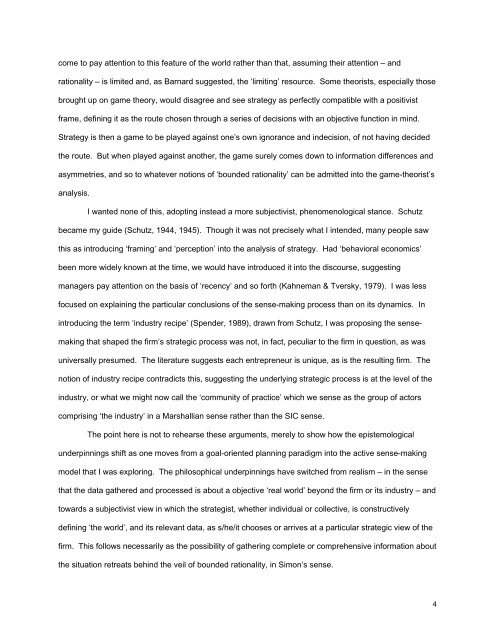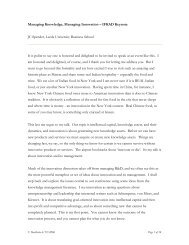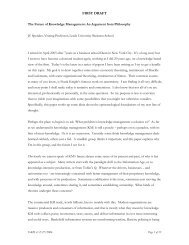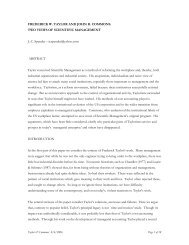PHILOSOPHY OF SCIENCE AND STRATEGY - JC Spender
PHILOSOPHY OF SCIENCE AND STRATEGY - JC Spender
PHILOSOPHY OF SCIENCE AND STRATEGY - JC Spender
You also want an ePaper? Increase the reach of your titles
YUMPU automatically turns print PDFs into web optimized ePapers that Google loves.
come to pay attention to this feature of the world rather than that, assuming their attention – and<br />
rationality – is limited and, as Barnard suggested, the ‘limiting’ resource. Some theorists, especially those<br />
brought up on game theory, would disagree and see strategy as perfectly compatible with a positivist<br />
frame, defining it as the route chosen through a series of decisions with an objective function in mind.<br />
Strategy is then a game to be played against one’s own ignorance and indecision, of not having decided<br />
the route. But when played against another, the game surely comes down to information differences and<br />
asymmetries, and so to whatever notions of ‘bounded rationality’ can be admitted into the game-theorist’s<br />
analysis.<br />
I wanted none of this, adopting instead a more subjectivist, phenomenological stance. Schutz<br />
became my guide (Schutz, 1944, 1945). Though it was not precisely what I intended, many people saw<br />
this as introducing ‘framing’ and ‘perception’ into the analysis of strategy. Had ‘behavioral economics’<br />
been more widely known at the time, we would have introduced it into the discourse, suggesting<br />
managers pay attention on the basis of ‘recency’ and so forth (Kahneman & Tversky, 1979). I was less<br />
focused on explaining the particular conclusions of the sense-making process than on its dynamics. In<br />
introducing the term ‘industry recipe’ (<strong>Spender</strong>, 1989), drawn from Schutz, I was proposing the sensemaking<br />
that shaped the firm’s strategic process was not, in fact, peculiar to the firm in question, as was<br />
universally presumed. The literature suggests each entrepreneur is unique, as is the resulting firm. The<br />
notion of industry recipe contradicts this, suggesting the underlying strategic process is at the level of the<br />
industry, or what we might now call the ‘community of practice’ which we sense as the group of actors<br />
comprising ‘the industry’ in a Marshallian sense rather than the SIC sense.<br />
The point here is not to rehearse these arguments, merely to show how the epistemological<br />
underpinnings shift as one moves from a goal-oriented planning paradigm into the active sense-making<br />
model that I was exploring. The philosophical underpinnings have switched from realism – in the sense<br />
that the data gathered and processed is about a objective ‘real world’ beyond the firm or its industry – and<br />
towards a subjectivist view in which the strategist, whether individual or collective, is constructively<br />
defining ‘the world’, and its relevant data, as s/he/it chooses or arrives at a particular strategic view of the<br />
firm. This follows necessarily as the possibility of gathering complete or comprehensive information about<br />
the situation retreats behind the veil of bounded rationality, in Simon’s sense.<br />
4





